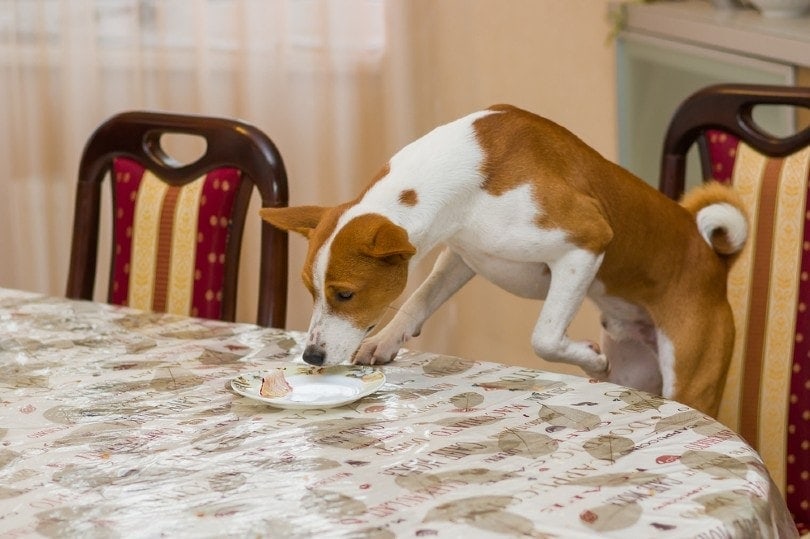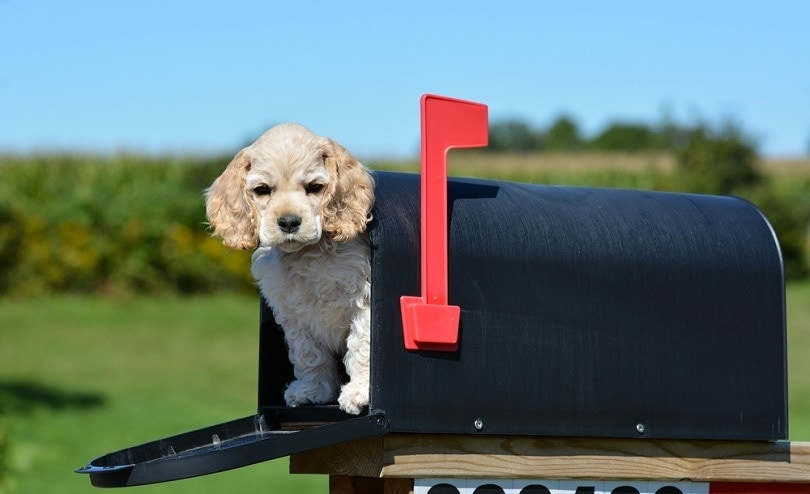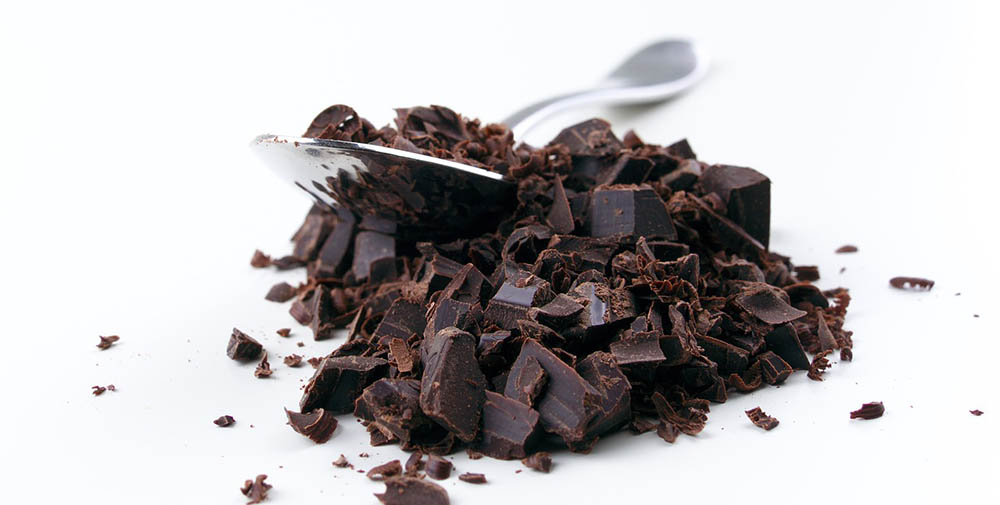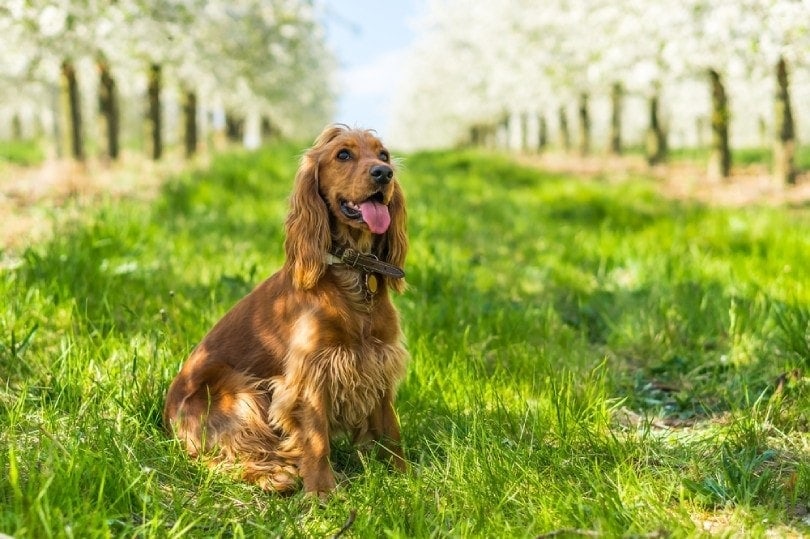Most dogs will beg at the table, especially if you have something that smells particularly yummy. It can be very tempting to feed your canine scraps when they’ll giving you those puppy-dog eyes. However, even food that we consider healthy for us may not be suitable for our canines.
Many of the foods we eat can cause serious problems for dogs. If you feed your dog table scraps, they could inadvertently develop health problems. Here are some common problems among dogs that eat table scraps:
The 5 Ways Table Scraps Can Hurt Your Dog:
1. Pancreatitis
Pancreatitis is primarily caused by fatty foods, which may be abundant on your table. Usually, dogs don’t eat massive amounts of fat with their regular diet, but they may encounter lots of fat if fed table scraps.
The pancreas’s job is to release special enzymes into the digestive tract to break down fatty foods. This promotes digestion and ensures that your dog’s food is completely broken down. However, sometimes the pancreas releases these enzymes too early. Since there isn’t any food to break down, they start breaking down the pancreas instead. This is pancreatitis.
Eventually, the enzymes end up leaking into the abdominal cavity. This allows them to attack other organs, like the liver and intestines.
There are several causes of pancreatitis, though it is not yet fully understood. A high-fat diet is one of the main causes of acute pancreatitis, which suddenly comes on. If not treated, pancreatitis can be deadly in severe cases.
Usually, the symptoms are pretty vague. They can include pain, vomiting, and diarrhea. However, many illnesses cause these problems, so lab work is required for a diagnosis.
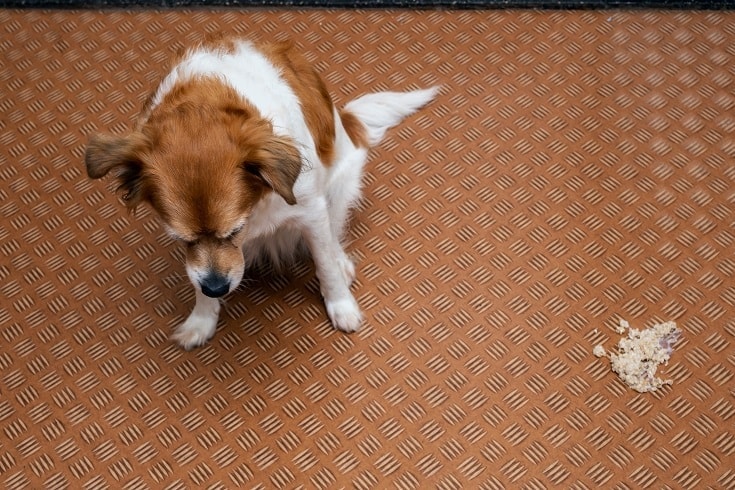
2. Gastrointestinal Upset
Just like people, canines may develop stomach upset if they eat certain foods. Our dogs aren’t used to the rich, fatty foods that we often eat. If you feed your dog table scraps, you may inadvertently cause them stomach problems.
Dogs that have digestive sensitivities may have particular problems with table scraps. Some dogs are more sensitive than others, similarly to people. New foods may disrupt their gastrointestinal tract and cause serious all sorts of gastrointestinal symptoms.
For example, a pet may suffer from vomiting, diarrhea, lethargy, and loss their appetite. Dogs may experience stomach cramps and pain, though this can be more difficult for their owners to identify.
Often, these symptoms disappear on their own, but they can cause significant issues for some canines. Veterinary care may be required, especially for dogs that become dehydrated.
3. Toxin Exposure
Many of the foods we eat are toxic to our furry friends. Things like onions, garlic, raisins, grapes, and chocolate can all cause serious illnesses. Often, pet owners may not wholly think about these ingredients’ potential harm until the dog shows symptoms later. They can be introduced in harmless ways, such as the seasoning on top of meat or added ingredients to bread.
If eaten in high enough amounts, these foods can cause serious problems. For instance, grapes can cause kidney failure, while xylitol can cause severely low blood sugar. Both of these problems can lead to death if not treated. In severe cases, they may lead to death even with treatment, as there is no “antidote” to these toxins.
Usually, treatment involves supportive therapy until the body passes the toxin on its own. IV fluids and medication to manage symptoms may be given. Most dogs make a full recovery. Occasionally, the toxins may cause permanent damage to the dog’s organs, especially those that affect the kidneys.

4. Bone Splinters
If you feed your dog anything with bones in it, your dog risks ingesting bone splinters. The cooking process dries bones considerably, making it easier for them to splinter. This is especially true for poultry bones, though pork and steak bones should be avoided as well.
These pieces can get caught in your pet’s mouth and throat. This can cause minor to moderate injuries. If the bone fragments skip your dog’s throat, they may get stuck into your dog’s intestines. They can damage the intestinal walls, which can potentially damage your dog’s digestive tract considerably.
They can cause considerable pain and distress to your dog. Sometimes, surgical removal may be required. Larger chunks of bone are particularly troublesome, as they can cause more damage.
5. Foreign Bodies
Some things cannot be entirely digested by our dogs, including bones, pits, corncobs, and similar foodstuffs. These foreign bodies can become stuck in their digestive tract, causing a blockage. If not treated, these blockages can be fatal.
Usually, dogs with blockages will lose their appetite. They may vomit, have diarrhea, and lethargic.
If you suspect your dog has an intestinal blockage, we recommend calling your vet as quickly as possible. This disorder can become serious very quickly. If you catch it soon enough, your vet may be able to induce vomiting. However, this is unlikely to happen if you regularly feed your dog table scraps, as you won’t think anything of them scarfing down some more food.
Impactions are notoriously tricky to diagnose. Multiple x-rays are often needed, as well as abdominal ultrasounds. Often treatment involves either aggressive fluid therapy to flush out your dog’s system. However, surgery may be required in some instances.
When to Speak to Your Vet
Many of these complications are quite severe and require attention from your vet quickly. Early treatment is often best, especially for toxins and similar health problems. If your pet begins showing any unusual symptoms, you should contact your vet. Symptoms may not happen until hours or even days after the table scraps are consumed.
If your pet needs to see the vet, be sure you inform them of any table scraps they have eaten. Having a complete recipe is often best, as things like onions and grapes can hide in some seemingly innocent foods.
In the end, it is often best to avoid feeding your pet table scraps altogether. They do not provide many benefits in most cases and can potentially cause significant problems.
Check out some of our top-trending posts:
- Can Dogs Carry Bed Bugs? What You Need to Know!
- 6 Dog Training Services Contract Templates (PDF)
- How to Discipline a Puppy – 7 Humane & Easy Methods
Featured Image: Yuri Kravchenko, Shutterstock
